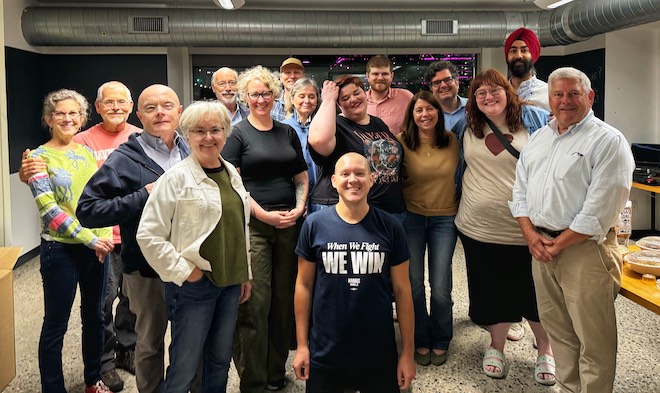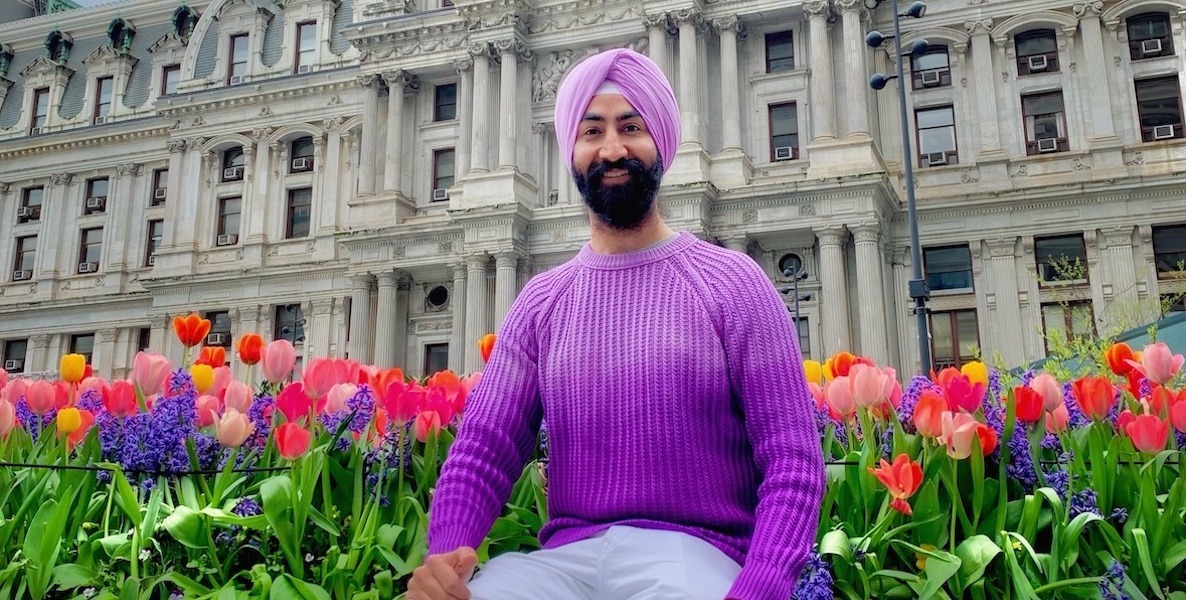When Arashdeep “Arash” Singh saw his friend’s social media posts about getting people out to vote in the election this fall, he replied with a simple question: “I cannot vote, but is there anything I can do?”
The friend responded by introducing him to Changing the Conversation Together for Progress (CTC), a political organization focused on “deep canvassing,” a strategy that prioritizes “high quality, meaningful and effective conversations” that focus on love when talking with potential voters. Singh immediately gravitated to the work. “Ultimately, even if I’m not a voter, I want to live in an environment that’s more hopeful, more positive, and more loving,” he says.
For the last few weeks, Singh has been spending his Tuesday evenings with the organization, helping with data entry as needed and putting together clipboards of materials for volunteers to use while canvassing in West Philly on the weekends. (Sign up here to become a canvasser.) Although he’s holding off on canvassing until he’s fully versed in CTC’s conversational model, spending time with a group of people so diverse in age and background has been enlightening.
“Every time I go, they tell me, ‘Do you know this about the U.S.A.? Do you know about this president?’” Singh says. “They’re very educated people, but they are also so humble and down to earth. There, whether you are a lawyer, an ex-president of a union, a research scientist, or a janitor, everyone is equal.”
This idea of equality connects to Singh’s Sikh faith, he says.
“If you go to any of the Sikh temples, we all sit on the floor, we all eat the same food. Whether you are male, female, whether you have belief in God or you don’t, everyone is equal, everyone can come in,” Singh says. “And then the other principle is that you have to fight against injustice.”
On both those counts, isn’t that what democracy is supposed to stand for?
“Everything is connected”
Singh, who was born and raised in Punjab, India, started his higher education journey close to home — earning his bachelor’s degree in biotechnology from the Thapar Institute of Engineering and Technology. He cast a wider net for his PhD in nutrition and physiology, applying to top universities around the world and landing at the University of Calgary in Canada, which offered him the best scholarship option.
At 34, Singh is now living in Fishtown. He’s been in Philly for two-and-a-half years and the U.S. for six, working as a research associate at the Monell Chemical Senses Center, a University City nonprofit where he investigates the impact of diet on metabolic disorders, which disrupt the body’s ability to convert nutrients into energy. His “work family” has been a constant source of support throughout his time in the city, he says.
“There are some people who would give up on the system, saying ‘I have voted five times and nothing changed, so the whole system needs to be torn down.’ To me, you have to make an effort.” — Arash Singh
As someone who studies the intricacies of macronutrients — how slightly altering the percent of calories that come from protein, carbohydrates and fats could impact people’s health — Singh takes issue with “new fads” and trendy diets that aren’t based on evidence. Every year or so, he says, a new diet trend will pop up, often promoted by social media influencers who happen to be in good shape. People look at the picture and believe their claims without fact-checking, or even if they attempt to, the only information backing the diet is a blog post, not a research article.
The dangers of misinformation, of course, go beyond the health and wellness scene. In the lead-up to the 2024 presidential election, immigration has been a hot-button issue — from attack ads characterizing Kamala Harris as a “failed border czar” to Donald Trump falsely claiming in the presidential debate that Haitian immigrants in Springfield, OH are eating household dogs and cats, to the more generally erroneous premise that newcomers to the U.S. take jobs away from U.S. citizens.
When asked how he feels about immigration narratives shaping this election cycle, Singh explains that he always relies on his “researcher point of view,” carefully questioning and fact-checking all the information he can acquire before reaching a conclusion.
“You have to be mindful,” he says. “Am I given true numbers? Am I given true values? All those things … Give me the data, and that’s how I’ll come up with those narratives. So from an immigration perspective, I think if everyone is coming through a legal route, then yes, they should be appreciated and treated with equal respect.”
While he’s never personally had to navigate the asylum process, he says that just applying for and renewing different types of visas has been complex. “To me,” he adds, “it’s like if someone is doing everything as per the process that you have set, then you should be more respectful towards them.”
Whether he’s talking about health or politics, Singh insists that it’s essential to look at the bigger picture. After all, solutions to major issues can’t be found in fads or scapegoats.
“I think everything is connected, every organ is connected. It’s not like one part is mediating everything,” he says. “The environment that you live in changes a lot of how you would be as a person, whether it’s your health, your communication, your social behavior, your mental health, it’s all dependent on your environment.”
He says the choices people make about food and health are connected to their personal economic positions, as well as global politics. None of it happens in a vacuum — everyone impacts each other. “At the end of the day, if I’m Elon Musk, I can just live in space. I don’t have to be bothered by petty things. But we’re not in that situation,” Singh says.

An ambassador for his people
Democracy, Singh says, is all about respecting other people’s opinions, values, and differences — but it’s also important to make whatever small contribution you can. “There are some people who would give up on the system, saying ‘I have voted five times and nothing changed, so the whole system needs to be torn down,’” he says. “To me, you have to make an effort.”
Even though he isn’t a U.S. citizen, Singh feels a duty to do what he can to improve the system and environment around him, believing that international researchers like himself can have a “mutually beneficial” effect on the country. He points out that international researchers make up a huge percentage of all postdocs working in the U.S. According to a study from the National Science Foundation, over 54 percent of postdocs are foreign nationals.
“I feel that I should be acting as an ambassador for my religion, for my country, for my state, and I should be making people aware. It’s as if I’ve won a gold medal in the Olympics, then it’s my responsibility to make people aware of that sport,” he says.
He’s learned to distinguish between people who are curious about his country, background and Sikh religious beliefs, and those who refuse to budge from prejudice, saying things like “You should go back to your country,” and “You are all terrorists.” Sometimes, he fears for his safety because of ignorant rhetoric. However, he still believes in the power of empathy and starting conversations with people who have “learning attitudes,” which is what CTC is all about.
Looking forward, Singh plans to stay in the country “for the foreseeable future,” but he’s not sure yet if he’s going to pursue citizenship. He says the decision will depend on two major factors: his career, and whether his parents, whom he credits with shaping his attitude toward getting involved and giving back to his community, want to join him in the U.S.
Singh’s friends at CTC share that very same mentality. “I can make a tiny difference, and it can help someone, and that’s what I’m here for,” Singh says. “That’s what my faith teaches me, that’s what my family has always taught me: help people as much as you can.”
Clarification: An earlier version of this story misstated how long Singh has lived in Philadelphia. He has resided in the U.S. for six years and Philadelphia for two-and-a-half years.
 Every Voice, Every Vote funds Philadelphia media and community organizations to expand access to civic news and information. The coalition is led by The Lenfest Institute for Journalism. Lead support for Every Voice, Every Vote in 2024 and 2025 is provided by the William Penn Foundation with additional funding from The Lenfest Institute for Journalism, Comcast NBC Universal, The John S. and James L. Knight Foundation, Henry L. Kimelman Family Foundation, Judy and Peter Leone, Arctos Foundation, Wyncote Foundation, 25th Century Foundation, and Dolfinger-McMahon Foundation.
Every Voice, Every Vote funds Philadelphia media and community organizations to expand access to civic news and information. The coalition is led by The Lenfest Institute for Journalism. Lead support for Every Voice, Every Vote in 2024 and 2025 is provided by the William Penn Foundation with additional funding from The Lenfest Institute for Journalism, Comcast NBC Universal, The John S. and James L. Knight Foundation, Henry L. Kimelman Family Foundation, Judy and Peter Leone, Arctos Foundation, Wyncote Foundation, 25th Century Foundation, and Dolfinger-McMahon Foundation.
![]() RELATED
RELATED



